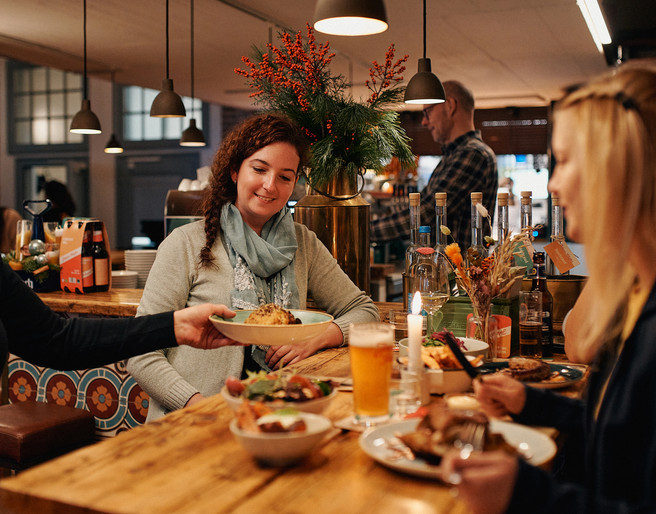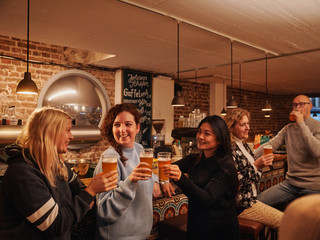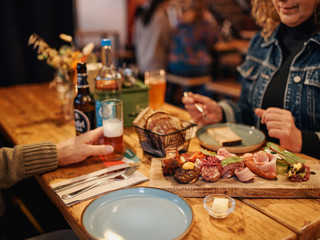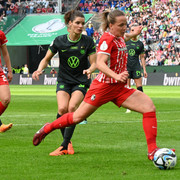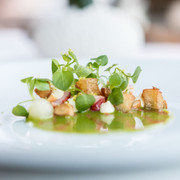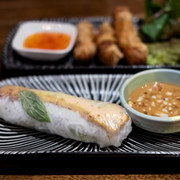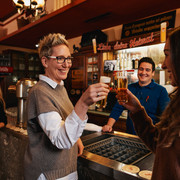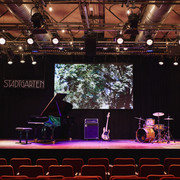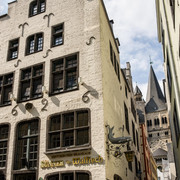Photos & Map
Details
Useful Information
Nearby
Not all brewery pubs are alike — that’s certainly what everyone thinks when they see the sheer number of Cologne’s brewery pubs on the list of watering holes in the metropolis on the Rhine. But some people would be surprised to discover that there’s a very modern version of Kölsch tradition: the Johann Schäfer brewery pub in Cologne’s Südstadt district, which has only been offering food and drink since 2017. It’s not at all what you’d expect. It even sells more Pilsner beer than Kölsch and offers vegetarian as well as vegan cuisine.
If you’ve always felt that lingering traditionally within dark wooden wainscotting and the banter of the classic Köbes are a bit over the top, you’ll find an ambience more to your taste in the rooms of the Johann Schäfer brewery pub with their modern industrial design. Nonetheless, this is definitely a brewery pub, with its own-brand beer. Which of course is Kölsch.
The menu — enjoy your meal
In its bill of fare the Johann Schäfer brewery pub also diverges from the traditional offerings of other establishments. Instead of ordering a classic dish from the menu, here you put together the individual components yourself, just as you like. Especially worth mentioning is the wide range of choices available to you if you’re a vegetarian or a vegan.At the weekend, the pub offers a tempting breakfast to go with your morning pint — including sandwiches, pancakes, ground pork snacks, bacon and eggs and even vegan tomato shakshuka.
The concept: regional, sustainable, traditional and fresh
Regional and seasonal products, meat from humanely raised free-range livestock, nose-to-tail cooking, heritage potato varieties, and sustainable fishing are all fixed components of the overall catering concept of Johann Schäfer.In addition to the own-brand Südstadt pilsener and Kölsch beers, there’s a changing array of other traditional beers.
A brewery pub in the Südstadt
The Johann Schäfer brewery pub is located in Elsaßstraße in the centre of the Südstadt district, just a five-minute walk from the Chlodwigplatz. It welcomes walk-in customers, both locals as well as people out on the town. In the summer you can sit outdoors along the sidewalk — if you can find an empty table. It’s often worthwhile to wait for a few minutes.A pop-up beer garden — Johann Schäfer on the Rhine Promenade
Since 2020 these culinary delights have also been served at an extension in the open air — the Johann Schäfer pop-up beer garden. The new hotspot on the Rhine is located between the Rheinauhafen (Rheinau Harbour) and the Südbrücke. To strollers along the Rhine, it offers beer, sausage and chips that can be enjoyed at once or taken away. Depending on the season, the beer garden also serves hot drinks.The premises: Formerly the Johann Schäfer haulage firm
A horseshoer’s smithy, a car park, a repair shop and a warehouse — over the past 100 years, the premises occupied by the brewery pub today have been used for every imaginable purpose. The residential and commercial building constructed at this address in 1889 was once used to shoe horses’ hooves. In 1935 it even shod the brewery horses of the Sester brewery. Alert guests will notice a metal ring or two protruding from the brickwork for tethering the customers’ horses.After the Second World War the badly damaged building was reconstructed, and Johann Schäfer established his haulage firm here in the 1950s. His lorries were parked in the hall. After the haulage firm moved its lorries to the city’s Klettenberg district in the 1980s, the old hall was still used as a workshop, storage area and office until it was renovated in 2016.
A “private fun-fair pub with a stage” becomes a brewery pub
Until the mid-1980s the hall that is now the brewery pub was also the venue of the big street fair organized by the Johann Schäfer haulage firm every year. On these occasions the hall was always adapted to function as a private pub. Renowned Cologne bands such as the HÖHNER and the Bläck Fööss performed on the improvised stage.The hall was converted into a convivial gathering place in 2016, after the idea arose of promoting happy get-togethers on a daily basis rather than staging them only once a year. The Johann Schäfer brewery pub has been enriching Cologne’s restaurant scene and brewery pub culture ever since.
Useful Information
Openings
Eligibility
Bad Weather Offer
Suitable for any Weather
For Groups
for familys
for individual guests
Parking facilities
Social Media
Author
